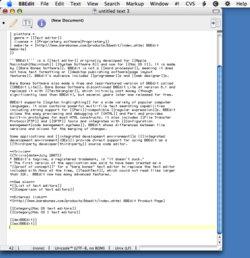- BBEdit
-
BBEdit 

BBEdit editing its own Wikipedia articleDeveloper(s) Bare Bones Software Stable release 10.1[1] / October 5, 2011 Operating system Mac OS X Type Text editor License Proprietary Website BBEdit Website BBEdit is a proprietary text editor made by Bare Bones Software. It was originally developed for Macintosh System Software 6 and is now available for Mac OS X.
BBEdit is marketed under the trademark slogan, "It doesn't suck."[2]
Contents
History
The first version of BBEdit was created as a "bare bones" text editor to serve as a host application for a "proof of concept" to replace the TextEdit control used in Mac OS at the time, which could not read files larger than 32K. Taking advantage of its then-unusual plugin support, third party developers started writing plug-ins to insert HTML code in 1994 to make composing web pages easier. In fact, the developers at Bare Bones Software first learned of the existence of HTML through users inquiring about these plug-ins and later bought the rights to the code from their author and included them as part of the standard BBEdit package. The tools were included as an optional palette in version 4, and were progressively more integrated, gaining their own menu in version 5.0.
BBEdit was available at no charge upon its initial release in 1991, but was commercialized in May 1993 with the release of version 2.5.[1]
At the same time, Bare Bones Software also made a less-featured version of BBEdit 2.5 called BBEdit Lite available at no cost. Bare Bones Software discontinued BBEdit Lite at version 6.1 and replaced it with TextWrangler, which was available for a fee, although significantly less than BBEdit. Several years later it too was released for free.
BBEdit's creator code
R*chrefers to Rich Siegel, Bare Bones Software's founder.Features
BBEdit is designed for use by software developers and web designers.[2] It has native support for many programming languages and custom modules can be created by users to support any language. BBEdit is not a word processor, meaning it does not have text formatting or page layout features.
The application contains powerful multi-file text searching capabilities including strong support for Perl-compatible regular expressions. BBEdit allows easy previewing and built-in debugging of HTML and provides built-in prototypes for most HTML constructs. It also includes FTP and SFTP tools and integrates with code management systems. BBEdit shows differences between file versions and allows for the merging of changes. Support for version control, including CVS, Perforce, and Subversion is built in.[2]
Some applications and integrated development environments (IDEs), including Apple's Xcode provide direct support for using BBEdit as a third-party source code editor.
BBEdit supports the Open Scripting Architecture and can be scripted using AppleScript and other languages, as well as having the ability to execute AppleScripts itself.[3]
Language support
BBEdit supports syntax highlighting for a wide variety of popular computer languages. As of version 8.7, these include: ANSI C, C++, CSS, Fortran (through Fortran 95), HTML, Java, JavaScript, JSP, Object Pascal, Objective-C, Objective-C++, Perl, PHP, Python, Rez, Ruby, Setext, SQL (including Transact-SQL, PL/SQL, MySQL, and PostgreSQL), Tcl, TeX, UNIX shell scripts, XML, and YAML. BBEdit's SDK allows users to develop additional language modules.[4]
See also
References
- ^ Bare Bones Software (2011). "BBEdit 10.1 Release Notes". http://www.barebones.com/support/bbedit/arch_bbedit101.html. Retrieved 2011-10-11.
- ^ a b c Bare Bones Software (2008). "Bare Bones Software - BBEdit 9". http://www.barebones.com/products/bbedit/index.html. Retrieved 2008-09-20.
- ^ Bare Bones Software. "BBEdit’s Other Useful Features". http://www.barebones.com/products/bbedit/featuresmore.shtml. Retrieved 2007-09-03.
- ^ Bare Bones Software. "BBEdit’s Display Features". http://www.barebones.com/products/bbedit/featuresdisplay.shtml. Retrieved 2007-09-03.
External links
Categories:- Mac OS text editors
- Mac OS X text editors
Wikimedia Foundation. 2010.
